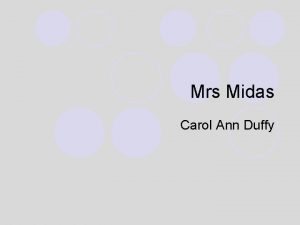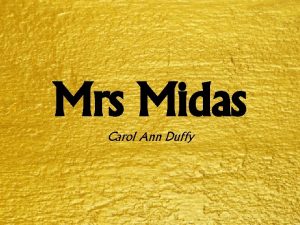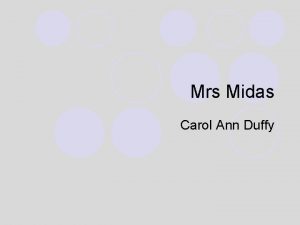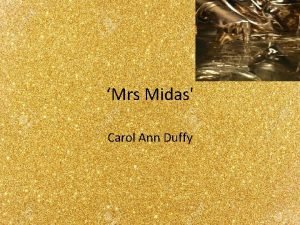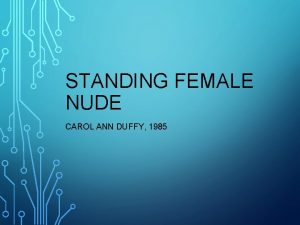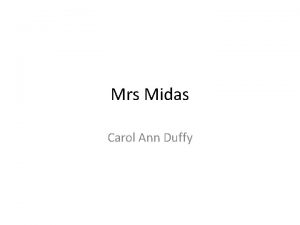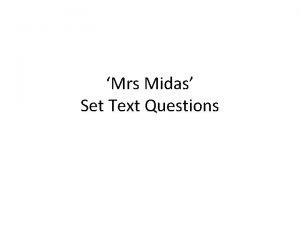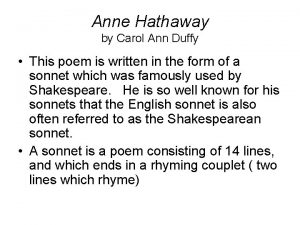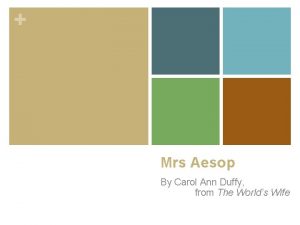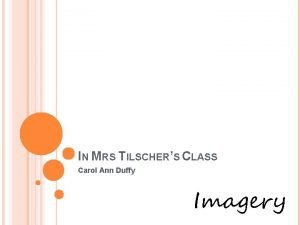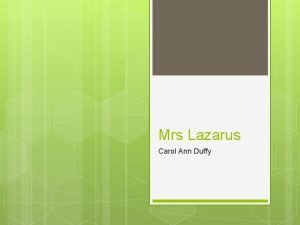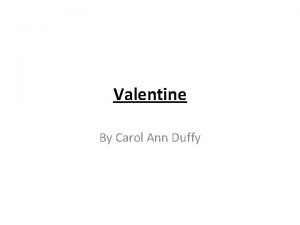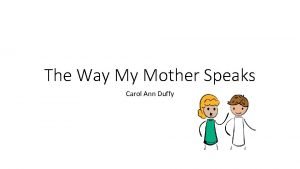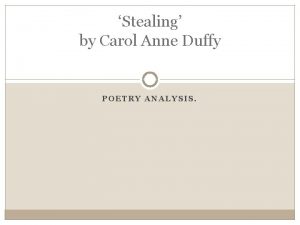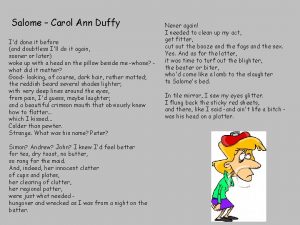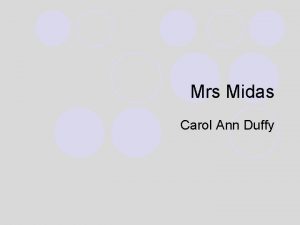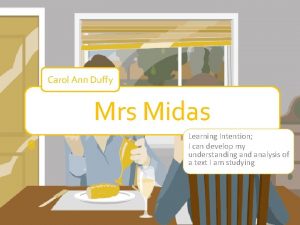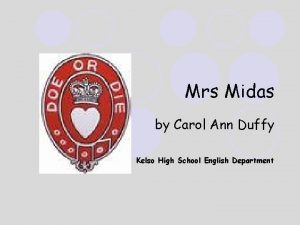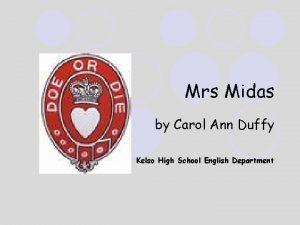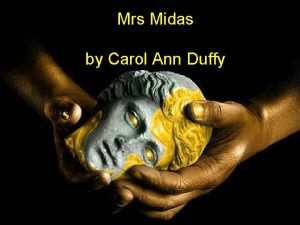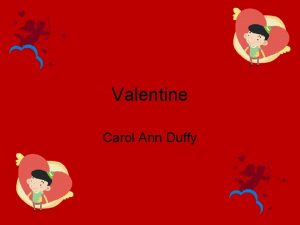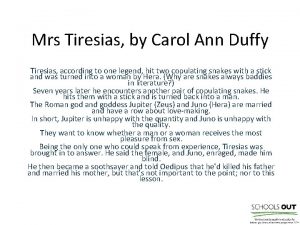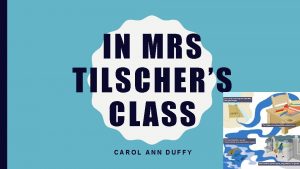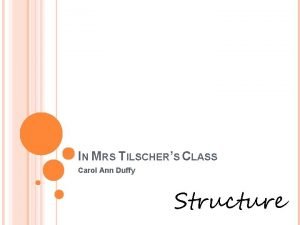Mrs Midas Carol Ann Duffy Introduction Mrs Midas























- Slides: 23

Mrs Midas Carol Ann Duffy

Introduction • “Mrs Midas ” is one of the poems included in Carol Ann Duffy ’s 1999 collection “The World’s Wife ”. In this collection she used wit and humour to great effect to debunk the pretentiousness of men down the centuries. Figures from history and myth were perceived from an irreverent female perspective to make a series of incisive comments about woman’s place in the world and also to reveal aspects of her own complex psychology.

Introduction • The myth on which the poem is based is the story first told by Ovid in his “Metamorphoses”. Midas, king of Phrygia, is granted a wish by the god Dionysus and his greed prompts him to ask that everything he touches will turn to gold. The wish comes true but Midas soon comes to regret his choice, given that life becomes impossible if every morsel of food one touches changes into hard yellow metal. Midas is forced to ask Dionysus to reverse the spell.

Summary • Carol Ann Duffy’s poem tells the story as though it was happening in 20 th century England, with herself as the wife of King Midas, although the name only appears in the poem’s title and there is no indication in the poem that anyone is royal or has a particularly elevated station in life. The name “Pan” is used once (a passing reference to another aspect of the King Midas legend) but that is the only link to the classical original apart from the consistent theme of the “touch of gold”. JNicolson

Summary • The poem comprises eleven six-line unrhymed stanzas. It reads almost like prose with plenty of run-on lines and not much evidence of rhythm. However, there is plenty of rhythm in the ideas, as concepts build on each other and relationships between concepts become clear to the reader. It is a poem that works well when read aloud, because the reader can add pauses that emphasise the links, and a number of these only become clear on a second or third reading when the words are read on the page. JNicolson

Overview of poem • Stanzas one to six deal with the discovery of Midas’ granted wish, and the sheer panic at the realisation and of the tremendous power he has been given. At the same time, a comic tone is maintained throughout, as Mrs Midas even catalogues everyday items being turned to gold. • The remainder of the poem reveals the harsh heartfelt implications of Midas’ gift, highlighting the damage it has done to the couple’s relationship and their future together. The final line in the poem sums up Mrs Midas’ regret at the loss of physical contact with her isolated husband.

Stanza 1 • ‘It was late September. I'd just poured a glass of wine, begun to unwind, while the vegetables cooked. ‘ • The poem begins in 'late September', a time when the colour gold begins to appear naturally and when the harvest is brought in but, less positively, it is also a time when things come to an end. In the Midas household this period will signal the end of their relationship but there is a contrast between the natural processes of the autumn and the unnatural events surrounding Midas.

Stanza 1 • ‘In the first stanza, Duffy presents Mrs Midas in a typical domestic scene, pouring a glass of wine as she cooks and begins to unwind in the kitchen, filled with the smell of itself, during the peak of the golden autumnal month of September. • Word choice/enjambment/personification • The description of Mrs Midas at home is replete with mundane domestic imagery( 'while the vegetables cooked‘), but there is a sense of comfort and satisfaction in these lines that comes from the enjambment and 'wine' and 'unwind'. The use of the verb 'blanching', usually applied to vegetables, to describe the personification of the kitchen's 'steamy breath' is both a visually appealing description of the steamed windows and an illustration of the harmonious relationship between Mrs Midas and her environment. The final line of the first stanza shatters this mood. Not only is it end -stopped but the final verb phrase 'snapping a twig' carries connotations of violence, while the phonological effects of the harsh consonance, the plosives and the short 'i' sound is jarring.

Stanza 1 • • • The kitchen with its steamy breath, gently blanching the windows is in contrast to the life - sapping events that are taking place in the garden, as Midas stands under a pear tree and snaps a twig which then miraculously turns to gold. …’it sat in his palm like a light-bulb. On. /I thought to myself, Is he putting fairy lights in the tree? ’’ Simile/sentence structure This simile effectively conveys both the shape of the pear and the brightness emanating from it. The full stops add a comedic effect, highlighting Mrs Midas’ shock, disbelief and sudden dawning of awareness of what she has just witnessed. This humorous imagery is continued and contrasts with the seriousness of what has just happened; Mrs Midas' incredulity is evident when she questions whether he is just putting fairy lights in the tree? The description of the garden and the way that the 'ground seems to drink the light of the sky' is perhaps Duffy deliberately delaying the moment of realisation for Mrs Midas for both comic effect, as when the pear sits in his palm 'like a light bulb', and also to evoke pathos for her as she asks herself 'Is he putting fairy lights in the tree? '

Stanza 3 • 'What in the name of God is going on? ' In contrast, his response is inappropriate, emphasised by the short, abrupt sentence and end-stop: 'he started to laugh. ' • Stanza three relays Midas’ return journey through the house as he turns the doorknobs and blinds into gleaming gold making his wife think back to a school history lesson about the Field of the Cloth of Gold, which was the site of the meeting between the kings of England France in 1520 when both monarchs built lavish temporary palaces, embellished with golden cloth. • Mrs Midas goes on to describe the strange, wild, vain face of her husband as he realises that he has been given a tremendous power, motivated by greed. Exasperated, Mrs Midas utters a typical expression. Her perplexed reaction causes her husband to laugh. Midas' return to the house is depicted in a string of short, simple sentences: 'You know the mind'. The use of direct address is conversational, almost confessional; Mrs Midas does not openly accuse her husband of being secretive and miserly, but implies it.

• • • Stanza 4 Mrs Midas attempts to instil a sense of normality by her matter-of-fact tone in serving up dinner: ‘ For starters, corn on the cob. / …spitting out the teeth of the rich. ’ This comedic effect is maintained. This line clearly demonstrates the negative effects of such a gift as Midas can no longer enjoy the simple pleasures of food, while emphasising that gold teeth are usually only seen in the mouths of the wealthy. Along with the catalogue of food utensils that have also been turned to gold, Mrs Midas’ anxiety about what is happening is revealed in the way she pours wine with a shaking hand. Rather than eating, Midas toys with the cutlery, introducing an important theme in this poem, the gap between ambition and need; Midas desires riches but needs to eat, and his ambition will cause him to starve. The moment of realisation is captured in the transformation of the 'glass' to 'goblet' to 'golden chalice' The blend of the vowels with the letter ‘l’ links to the golden luxury of the item, while the harsh alliterative ‘g’ sound drives home the seriousness of this socalled gift. The term 'chalice' has religious connotations due to its use in the Holy Communion meal which commemorates the Last Supper; furthermore, the expression 'a poisoned chalice' is a Shakespearean quotation which has entered the English language to mean an opportunity which seems promising but is found to be have hidden drawbacks. Both interpretations are relevant here as the couple are eating their last meal together and Midas will soon realise that his miraculous gift will carry a hidden price.

Stanza 5 • ‘It was then that I started to scream. He sank to his knees. ’ • Word choice • The sinking in of reality is further echoed in the first line of stanza five when Mrs Midas starts to scream while her husband sinks to his knees. • As both come to terms with his new power, Mrs Midas finishes off the wine and forces her husband to sit on the other side of the room and keep his hands to himself. • Even after becoming aware of the consequences, this humorous line reveals that, while Midas still seeks to enjoy a physical relationship with his wife, his new gift means that he will be deprived of this pleasure. • The stanza ends with Mrs Midas relaying the precautions she takes to protect the cat by locking it in the cellar and then moving the phone, but allowing the toilet to be changed into gold.

Stanza 5 • • • 'we all have wishes; granted. But who has wishes granted? ‘ word choice/pun/sentence structure/rhetorical question Duffy then inserts a deliberate pause to imitate the speaker’s incredulity upon hearing how her husband has been granted a wish. The word ‘granted’ is a pun which is repeated to convey her opinion that, in general, people can and do make wishes but if they are going to be given, then of course her fool of a husband had to be the one to have his wish come true. The use of word play in these lines and monosyllabic minor sentence which answers her rhetorical question 'Him' conveys her disgust with her husband. It is Midas' wish for gold that is outrageous; she asks another rhetorical question and answers 'it feeds no one and slakes no thirst. ' The imagery here is juxtaposed with that in the description of their love life in the following stanza, thus highlighting what they have lost. She goes on to explain the futility of such a wish since gold feeds no one. In doing so she exposes the lack of real value of gold. Even so, humour is injected to contrast with this harsh fact as Mrs Midas considers, on a more positive note, how the situation will mean that at least Midas will be able to give up smoking for good.

Mood changes • However, there is a noticeable change of mood in the second half of the poem as a note of tenderness enters. The realization that the couple must now lead separate lives is the ultimate horror for a woman who has clearly loved her husband. JNicolson

Stanza 7 • • The remainder of the poem continues to highlight the damage Midas’ gift has done to their relationship with the beginning of stanza seven summarising the full effect in the single statement: ‘Separate beds. In fact, I put a chair against my door/, near petrified. He was below, turning the spare room/ into the tomb of Tutankhamun. ’ Short sentence/humour/symbolism Mrs Midas’ terror of her husband touching her is continued and emphasised as she reveals how she even puts a chair against the door at night because she is near petrified, scared of being turned into gold, a harsh consequence and the reality, should he come near her. Humour again offers a bit of light relief as she relays how the spare room has been transformed into the impressive tomb of Tutankhamun. This symbolises that their relationship and dreams are effectively dead. Firstly, the couple must sleep in 'separate beds', and then it transpires, on separate floors, 'he was below', indicating the widening gulf between them. Although there is still humour in the use of internal rhyme: 'turning the spare room into the tomb of Tutankhamun', the imagery now carries connotations of death. The separateness of the couple is further highlighted as she focuses on the physical suffering they must now endure, in contrast to the fulfilling relationship they enjoyed before Midas was granted his wish.

Stanza 7 • The separateness of the couple is further highlighted as she focuses on the physical suffering they must now endure, in contrast to the fulfilling relationship they enjoyed before Midas was granted his wish. These were • ‘halcyon days, days of joy when they were passionate and unwrapping each other, rapidly, like presents, fast food. ’ • Contrast • The speaker contrasts the present reality of cold distance between the couple with the 'halcyon days' when they unwrapped one another 'like presents, fast food'; the imagery highlights the sensual pleasures of this honeymoon period. 'Halcyon days' is a classical allusion, denoting a mythological time in the middle of winter when the weather is calm; although the term is used to represent an idyllic period it also, by definition, foreshadows the return of winter as the halcyon period lasts only for seven days. This is evident in the next line 'now I fear his honeyed embrace' and the kiss that would 'turn my lips into a work of art'.

Stanza 8 • • • In stanza eight, Mrs Midas expresses her sadness now of being deprived of the opportunity to have a real baby. ‘Who…can live with a heart of gold? That night, I dreamt I bore his child, its perfect ore limbs, its little tongue like a precious latch, its amber eyes holding their pupils like flies. My dream-milk burned in my breasts/I woke to the streaming sun. . Rhetorical question/metaphor She begs the question: Usually, this expression has positive connotations and is associated with kindness and empathy. Here, this familiar metaphor is ironically inverted as the literal meaning is implied, inferring that it would be impossible to survive as a living being with such a heart. A superficial, initially attractive description of the baby she dreamt about is presented with its perfect ore limbs and amber eyes, but this descends into a disturbing image as these flame-coloured eyes are deemed to be holding their pupils like flies. Sadly, her milk will remain only a dream too as her breasts can never bear any milk as long as her husband has this gift. Waking to the streaming sun, again, poignantly reminds us that each day she will awake to a world in which gold dominates every waking moment.

Stanza 9 • In Stanza nine, the consequences of the myth and the effect on their lives continues to destroy their relationship as Mrs Midas bluntly informs us: • ‘So he had to move out. ’ • She then conveys how she had to drive him to live in their isolated caravan under cover of dark and how she returns alone as “the woman who married the fool”, clearly blaming her husband for stupidly wishing for gold. She tells of how at first she visited at odd times, always parking the car a safe distance away in case she was affected by his gift.

Stanza 10 • Stanza ten continues to present images of this solitary, distanced, detached separate lifestyle as she describes the single golden items she discovers on her walk from the parked car to her husband: • ‘Golden trout and a hare hung from a larch. She describes him in a sorrowful state as thin, delirious, hearing, he said, the music of Pan. ’ • Irony • This associates him to another Greek god, this time the isolated figure of Pan, who was the god of shepherds and flocks, and we note the irony that a gift so equated with wealth and prosperity should result in such emotional poverty.

Stanza 11 • The final stanza stresses Mrs Midas’ anger at her husband’s ‘pure selfishness’ in making a wish that has not only affected him but also deprived them both of any physical relationship and his wife of a chance to have her dream baby. • Word choice • In the end, the poet is reminding us that the myth of Midas, normally only viewed in connection with how it affected Midas and his life, also affected his poor wife who, even after all her anger has been unleashed, is still left alone with nothing but a wistful, regretful sense of loss for the man she married. In a poignant line, she remembers fondly their once full, physical relationship and mourns its passing: “even now, his hands, his warm hands on my skin, his touch. ” • The repetition of the words ‘hands’ emphasises too that his touch, once a potent symbol of their intimacy is now lost forever and reminds us that, unlike human skin to skin contact, gold is cold and hard.

Stanza 11 • The final stanza brings the whole matter home and gives the story its universal meaning. Mrs Midas explains that what really hurts is “not the idiocy or greed / but lack of thought for me”. She still loves her husband although they can never be together. She thinks about him frequently and, as is typical with people who are forced apart for whatever reason, things she sees can suddenly remind her of him and what she has lost (“once a bowl of apples stopped me dead”).

Final line • The final line is one that could be spoken by millions of women who have lost their life partner: • “I miss most, even now, his hands, his warm hands on my skin, his touch” (the last word of the poem being the most significant). • Word choice • Of course, the situation described in the poem is “fantastic” in the true sense of that word, but the sentiment is real enough. Relationships are often ruined through idiocy or greed, and there have been millions of Midases who thought that being rich would bring them contentment. Ironically, it is Mrs Midas who is now rich (“I sold / the contents of the house”) but neither she nor her husband have gained anything worthwhile from being so.

Final line • “Mrs Midas” is an excellent poem that manages to combine wit and humour with a strong and important message. Mrs Midas comes across as being warm and sympathetic and the possessor of a true “heart of gold”. In all the poems of this collection Carol Ann Duffy put a considerable amount of herself. When the reader or hearer experiences this poem they know that this is how the poet would feel were she to be put in the mythical situation she describes. Likewise, the reader can appreciate that this is a real situation for far too many people in the world today, and the response is a genuine one that is expressed, at the end, with tenderness and compassion.
 Mrs midas duffy
Mrs midas duffy Mrs midas summary
Mrs midas summary Mrs midas carol ann duffy
Mrs midas carol ann duffy A beautiful lemon mistake
A beautiful lemon mistake 1985
1985 Mrs midas tone
Mrs midas tone Mrs midas
Mrs midas Anne hathaway poem by carol ann duffy
Anne hathaway poem by carol ann duffy Aesop poem
Aesop poem The laugh of a bell swung by a running child
The laugh of a bell swung by a running child Carol ann duffy mrs lazarus
Carol ann duffy mrs lazarus Penelope carol ann duffy analysis
Penelope carol ann duffy analysis Liar carol ann duffy
Liar carol ann duffy Carol ann duffy we remember your childhood well
Carol ann duffy we remember your childhood well Half formed ghost
Half formed ghost War photographer annotated
War photographer annotated Themes in valentine by carol ann duffy
Themes in valentine by carol ann duffy The way my mother speaks
The way my mother speaks The good teachers poem pdf
The good teachers poem pdf The diet carol ann duffy analysis
The diet carol ann duffy analysis Stealing carol ann duffy poem
Stealing carol ann duffy poem Stealing by carol ann duffy summary
Stealing by carol ann duffy summary Shooting stars analysis
Shooting stars analysis Salome duffy
Salome duffy
